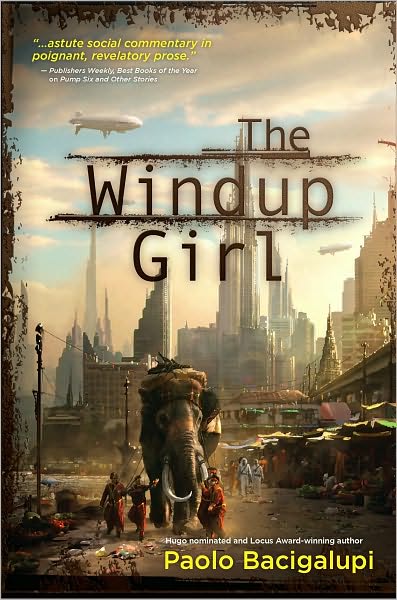Paolo Bacigalupi is no stranger to the Hugos. He’s been nominated for various stories four out of the past five years, and at the moment, his book The Windup Girl is in the running for the Best Novel category. The Windup Girl has already distinguished itself in this year’s awards circuit: it’s won a Nebula and the Locus for Best First Novel, as well as the Compton Crook award. (All it needs now to round out the collection is a nice, shiny Hugo, don’t you think?)
I’ll make no secret of the fact that I’m a fan of Bacigalupi’s work. His short fiction is complex and he has a gift for creating atmospheric imagery: the same is doubly true of The Windup Girl. At novel length his skill doesn’t just flow from the page, it grabs the reader and ties them to the story until they hit the end. If you do manage to put it down for a break, you’ll probably spend that break thinking about what’s going to happen next.
The Windup Girl’s title is slightly misleading in the sense that it isn’t about just Emiko, the windup. Instead, it’s built out of many stories from many characters that tweak, alter, influence and act as catalysts for each other. It is only in the rapid, explosive finale that the multiple storylines converge. Bacigalupi tells the stories as separate and equally intriguing narratives, but at the same time, he deftly weaves them into one larger picture that tells a story of corruption, politics, terror, and evil of both the mundane and the grand sorts. The future of this novel is not one that we would want to come to pass (though some days it seems more likely than others).
The perfect narrative juggling is what makes the book a winner, in my opinion. Bacigalupi manages to tell several distinct stories, each from characters who perceive themselves as the hero of their own tale, with different backgrounds and places in the dueling and sabotaging factions. So, as a reader, you find yourself often woven into the lives of two people who would likely prefer to kill each other, or supporting internally opposite factions or ways of living. Even Anderson, arguably one of the “worst” people at heart, is sympathetic in a way. The fact that he manages to never paint any of these characters as one-dimensional or villainous is marvelous. The Windup Girl plays to my weakness for characters who are unlikable or deeply awful in some way, yet still manage to draw your attention and interest.
However, not all of the characters are terrible people—some are just flawed in creative ways. My favorite of the book’s storylines is arguably the Jaidee & Kanya narrative. Jaidee has the best interests of his country at heart, and he’s perhaps the only one who does, but he’s headstrong and violent in a way that gets him and the ones he loves into unfixable trouble. His death is a gut-punch because I genuinely kept expecting him to succeed with his attempts to find his wife and then, after being caught, to at least take his captor down with him—but Bacigalupi doesn’t do the thing you expect with his “hero” figure. He kills him. (Of course, his haunting of Kanya is sort of like not-dying, but still. It’s not the predictable choice and it makes the story that much stronger as a whole.)
Despite my glee and love, there have been criticisms of this book. Something that others have seen as a flaw is actually one of my favorite parts of the book: its ability to make you feel icky. The Windup Girl is an intense read, and not generally in the pleasant way—there were points, especially in Emiko’s chapters, where I had to put the book down for a brief moment. Bacigalupi never writes his violence, be it sexual or not, in a gratuitous way, but he also does not shy away from it. The world of this near-future Thailand is rough and horrible in many ways to its people and he is always truthful about the ugliness. Emiko suffers more than most, but if he had winced away from writing the scenes of her abuse and rape or softened them while still portraying the other character’s tribulations, it would have been worse, I think.
The disclaimer is that I actually like to be made uncomfortable and to be made to cry and to be upset by books. I want to care. I want to be drawn in and along with the people on the pages. The Windup Girl, even and perhaps because of its cruelest moments, is a work of genius that does this seemingly without effort.
I sincerely hope the later this year I get to hear Paolo Bacigalupi accept the Hugo award for this twisty, complex, beautiful and horrifying book.
Lee Mandelo is a multi-fandom geek with a special love for comics and queer literature. She can be found on Twitter and Livejournal.










